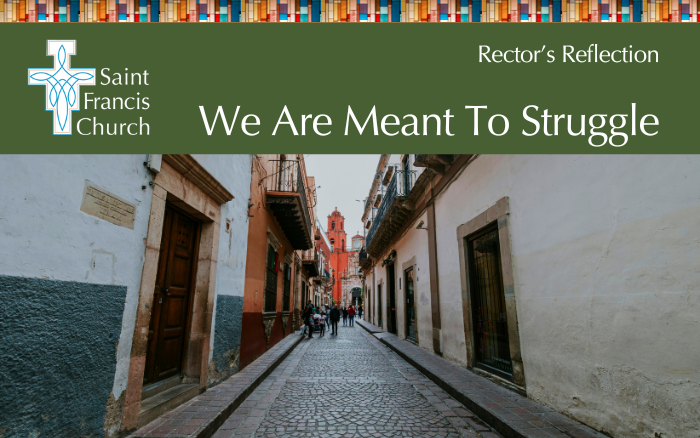Last week’s gospel was difficult and meant to make us feel uncomfortable. The gospel about the rich man and Lazarus is not a feel-good story of love and redemption; it is a warning against pride, arrogance, and putting our faith in anything other than God.
When he was alive, the rich man put all of his faith in his wealth, and his wealth was for him alone; he was the center of his universe, and everyone else was there to serve him. As I said on Sunday, wealth is not inherently evil or bad; it’s how we use it that gets us into trouble. And sometimes it’s how we don’t use it that gets us into trouble, as the rich man didn’t do anything to help Lazarus when they were alive.
Much of Jesus’ ministry was supported by wealthy people (nearly all of them women), as was the ministry of the early church. It’s how we use what we are given from God that matters.
As I said, the story of Lazarus and the rich man is meant to make us feel uncomfortable. Much of what we read in scripture is meant to make us feel uncomfortable. Our story of salvation can be distilled down to this: we are taught how to live in a way that both glorifies God and makes us feel wanted and loved; choose not to live the way we’ve been taught, things go wrong, and we turn away from God.
God gets angry, sends a prophet to tell us how to act, we promise we’ll do better, we don’t do better, and we suffer the consequences. This happens until Jesus’ crucifixion and resurrection, when we are taught that Jesus suffered the consequences for all people for all time. Now, what we need to do is confess our sins to ourselves and God, repent, and ask for forgiveness. And this is something we will repeat at varying frequencies for all of our lives.
So much of the discomfort I feel in reading scripture comes from knowing my sin, knowing and feeling that I’m forgiven, and knowing that I will sin again. I don’t know how many times I’ve ignored Lazarus, though it’s become far more frequent since moving to Los Angeles. I also know that if I helped every Lazarus that crossed my path, I would be as penniless as they are.
But there is a middle way, and as an Episcopalian, I am honor-bound to pursue it. I may not be able to financially support every unhoused person I meet, but I can certainly guide them to places where they can get a hot meal and a place to sleep for the night; I can pray for them, either with them or as I pass them. I can do the hard work that the gospel calls us to do.
It’s not easy work, and as I said last week, striking up conversations with strangers takes me right out of my comfort zone. But we are not meant to be comfortable all the time. When we do physical exercise, we have to experience discomfort if we want to make progress. When we want to strengthen our bond to Christ, we must exercise our souls; we must wrestle with the Word, as Jacob wrestled with God in the desert.
We must acknowledge our sin and distance from Christ, but in so doing, we also welcome the grace and love that enfolds us when we give ourselves completely to God. I don’t want to go to church and hear about all the ways I’m failing and falling short; I am all too aware of my sins. But I also don’t want to go and hear that everything is great and we’re all great and there’s nothing we need to do differently.
Because everything isn’t great, and there are lots of things I could do differently. I want to hear about the struggle. I want to hear that we are seen, forgiven, and loved. I want to be reassured that God’s grace covers all of us.
Jesus didn’t come to tell us we’re all going to hell, nor did he say keep up the good work; he came to show us how to live and gave all people the perfect example of selfless love. Love takes work, and at times it is deeply uncomfortable, but it is the best work we will ever do.
—Fr. Jason

